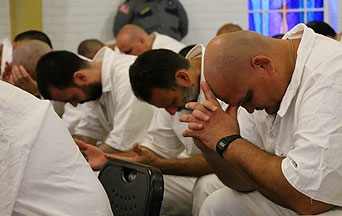
A Catholic web site recently published an article titled “Authorities Dumbfounded at Retreats with Adoration of the Blessed Sacrament in Prison, Causing a Total Change in Prisoners.”1 It is a striking testimony to the transformative power of the Church’s ministry.
The experimental program in Texas encouraged inmates to participate in religious retreats. Many of the participants were “very troublesome” prisoners embroiled in constant conflicts. But the program’s beneficial effects were quickly confirmed by the prison authorities.
Permanent Deacon Tommy Ewing, of the Diocese of Beaumont, Texas, introduced the program. At first, he was reluctant to enter prison ministry. “I was afraid and did not want to go into their cells.” When he overcame those fears, he found that “once you come into contact with these people, you realize that you are an instrument of God’s grace.”
According to Mr. Ewing, everyone is surprised. “You can see just how moved prisoners are.” Many of these moments happen during the adoration of the Blessed Sacrament. “You bring the light of Christ, and these men can feel it. That makes the difference.”
Learn All About the Prophecies of Our Lady of Good Success About Our Times
The Sacrament of Confession is central. Prisoners learn how Confession allows a person to unload their guilt to a priest with the power to absolve him. Many prisoners experience a new peace of mind after receiving absolution.
Deacon Ewing observes that “access to Confession and Eucharistic Worship soften even the hardest of hearts. It is a great life-changing experience.”
Michael Rutledge, Chaplaincy Deputy Director at the Texas Department of Criminal Justice credits the retreats for “bringing about a transformation.” After the initial success, Mr. Ewing and a few hundred volunteers facilitated the retreats in both male and female prisons.
When Deacon Ewing first approached officials with his plan in 2012, he was met with skepticism. Eventually, though, the officials agreed to allow Deacon Ewing to try.
A Medal, a Vision, a Conversion — The Story of Claude Newman
Sixty-six prisoners participated in the first retreat. Three weeks later, Mr. Ewing and the officials met to evaluate the program. The director had received more than sixty letters from the prisoners praising the initiative and detailing the benefits they received.
The prison director then asked when Deacon Ewing could organize another retreat.
When news got out to other state prisons, those officials requested similar retreats. The prison officials note they are particularly effective in exposing problems that worry the prisoners; thus allowing them to deal with and resolve them.
Many inmates wrote the volunteers to thank them and give their impressions. According to Mr. Ewing, the letters generally say that “they found friendship, love and brotherhood, [after] many of them had already lost hope.” In one letter, a prisoner wrote: “God created me, but you made me what I am today, which is what God wanted me to be. In my life, I will follow this way of faith in Christ to the end of my days and continue to fight for God’s love to remain in me.”
Saint Maximilian Kolbe: The Immaculata’s Perfect Knight
The incredible prison program of Deacon Ewing is yet one more proof of the universality of the Church’s message. Instead of looking for new and innovative programs based on liberation theology, progressive social justice and other aberrations, it would be better to use what works and has always worked: the adoration of Christ and the sanctifying action of the Sacraments.
